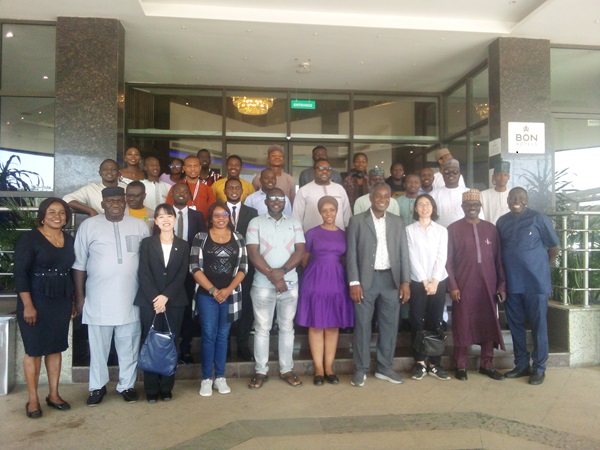
In a bid to drive agricultural transformation through digital innovation, the Sasakawa Africa Association (SAA), in collaboration with the African Forum for Agricultural Advisory Services (AFAAS), has announced plans to tackle challenges in digital agricultural extension. The initiative seeks to develop digital tools and engage private sector partners to support farmers and enhance productivity.
This was disclosed by country director of SAA Nigeria, Dr. Godwin Atser during a one-day demonstration workshop in Abuja. The workshop with the theme, “Showcasing digital agricultural extension service platforms in Nigeria” was organised in collaboration with Sahel Consulting and Africa Practice. It is part of a project tagged “A Consultative Engagement Exercise for a Product Profile Design for Nigeria’s Public-Private Partnership Digital Extension Delivery System” funded by the Bill and Melinda Gates Foundation.
Atser highlighted the proliferation of digital apps designed to address challenges faced by smallholder farmers. He emphasised that these tools could help bridge the gap in agriculture by providing farmers with vital information to improve productivity, enhance livelihoods and reduce poverty in rural areas.
“Food security remains a pressing issue in Nigeria, with discussions often revolving around access to meals,” Atser said. He noted that practical, timely advice on agricultural practices is crucial for farmers, rather than generalised information.
“Farmers need to know how to grow their crops better, when and how to plant, what diseases to anticipate and the appropriate actions to take. Additionally, they need guidance on where to find markets for their produce and the optimal time to sell to maximise their returns,” he explained.
With 70 per cent of rural Nigerians relying on agriculture, Atser stressed the critical role of extension services in providing tailored advice on crop management, disease prevention and market access.
The workshop aimed to evaluate the effectiveness of various digital platforms in agriculture, identify impactful tools and explore strategies to scale up their use. Participants included developers, private sector stakeholders and extension professionals who deliberated on solutions to existing challenges.
“The workshop adopts a practical approach to understanding how digital platforms can revolutionise agriculture,” Atser noted. He assured attendees that the outcomes would inform strategies to create a cohesive and impactful digital extension ecosystem.
A director in the Federal Department of Agricultural Extension Services at the Federal Ministry of Agriculture and Food Security, Dr. Deola Lordbangou highlighted the urgent need to revitalise extension services in Nigeria. He called for a multi-stakeholder approach involving government agencies, private sector actors and research institutions.
“The shortage of extension agents has created a disconnect between research institutions and farmers. Valuable findings are not reaching the end-users, resulting in low productivity, poor income and a declining standard of living for farmers,” Lordbangou explained.
He revealed that the Federal Ministry of Agriculture is prioritising digital extension services to transition from traditional methods to innovative digital systems. Several private sector players, including Akilibo, Igbita, Extension Africa and Agroinfotech Farmers, are already contributing significantly to extension service delivery. However, a more coordinated approach is necessary to maximise their impact.
“The National Assembly has pledged to pass the Agricultural Extension Service Delivery Revitalisation Bill, which will improve extension service delivery and accelerate food security efforts. This legislation is expected to boost food production and enhance the livelihoods of smallholder farmers across Nigeria,” Lordbangou added.
A representative of the Japanese Embassy in Nigeria, Ms. Yuka Furutani reiterated Japan’s commitment to supporting Nigeria’s food security initiatives. Through grants and technical assistance, the Japanese government has demonstrated its dedication to fostering sustainable agricultural practices in the country.
“Digital agricultural extension services are pivotal in achieving food security and sustainable production,” Furutani said. She outlined how digital tools have transformed inventory management, enhanced marketing functions and created credit bases for financial institutions. “These advancements have significantly improved the livelihoods of smallholder farmers in a sustainable manner,” she added.
Representing the National Information Technology Development Agency (NITDA), Mr. Ahmed Ibrahim emphasised the agency’s commitment to promoting digital agriculture in Nigeria. NITDA provides small-scale farmers with access to smart devices, internet connectivity and other digital tools to facilitate access to information, markets and financial services.
“Our goal is to create a digital ecosystem that supports the growth and development of Nigeria’s agricultural sector,” Ibrahim said. He highlighted the potential of leveraging technology to unlock economic opportunities and transform the agricultural value chain.
The collaborative efforts of SAA, AFAAS and other stakeholders mark a significant step toward addressing the challenges in agricultural extension services through digital innovation. By integrating digital tools, engaging private sector partners and fostering collaboration across sectors, Nigeria is poised to revolutionise its agricultural landscape.
Through these initiatives, smallholder farmers stand to benefit from increased productivity, improved access to markets and enhanced livelihoods. As the nation works towards food security, the emphasis on digital extension services promises a brighter, more sustainable future for agriculture in Nigeria.

